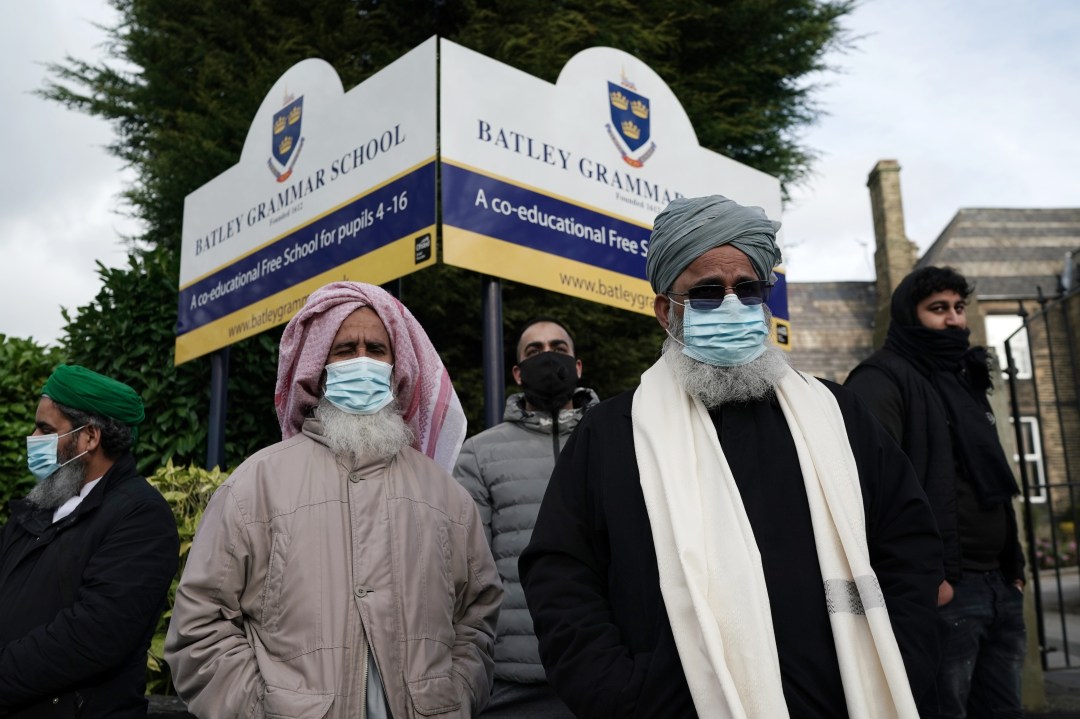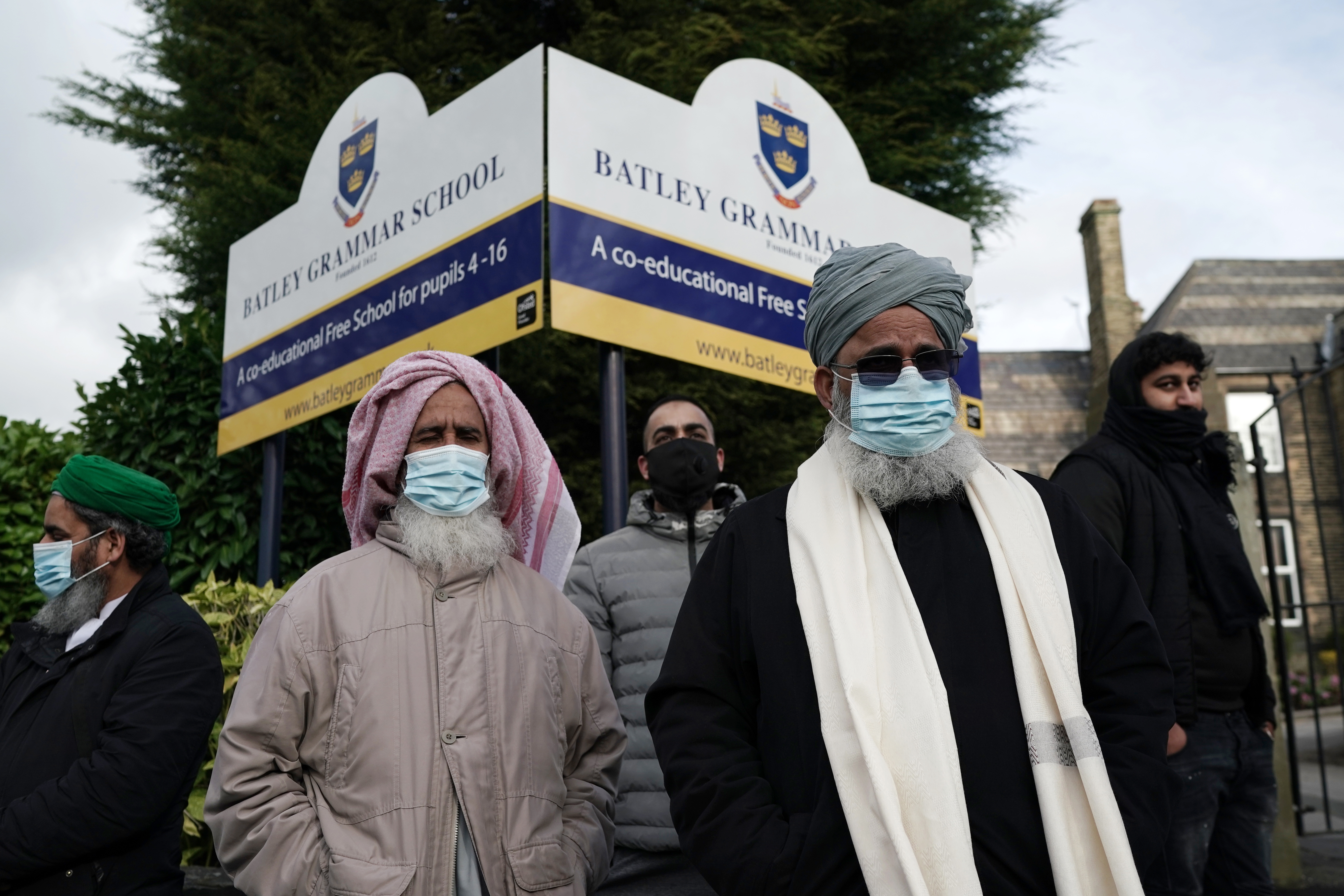The protestors outside Batley Grammar School could be heard shouting ‘Allahu Akbar’ — God is great. It’s a term I often use when I need spiritual strength, a basic prayer. But this time, the prayer was being used as a war cry by those who seemed to think that re-affirming their Muslim identity would help them sack a teacher in a school. It amounted to nothing less than the defamation of Islam.
There are perhaps three million Muslims in Britain, the vast majority of us proud to live in one of the most tolerant countries on earth and feeling no conflict between our faith and our nationality. British values are liberal values. Freedom of religion is respected, and freedom of speech too. But so often, the minority who have a problem with these freedoms speak more loudly than the majority. When a small number with recently-invented crackpot views pipe up and purport to speak for all Muslims — as they so often do — they are given platforms. It makes news. And it risks giving a dangerously distorted view of Islam in Britain.
I know of many Muslims who abhor the actions of the Batley demonstrators: why give the impression that Islam and its Prophet are so weak, as concepts, that they need defending against cartoons? But if you speak out against them, you make yourself a target by groups who foment a mob-style culture. What normal person — Muslim or not — would want to get involved in that kind of fight? The vast majority of Muslims want no part in the crazed (and, often, imported) debate: they’re too busy living, working with and being part of modern Britain — as your neighbours. Your colleagues. Your friends.
The demonstrations outside Batley Grammar School took me back to those days after the publication of The Satanic Verses in 1989: demonstrators shrieked, raising their fists in the air and shouting out ‘Allahu Akbar’ as though their anger alone could pulp all of the publications of the book. This was all quite new. Who can also forget the banality of those in Bradford who burnt copies with no forethought as to how that would look and feel to a British audience. It introduced this bizarre and (to me) hateful notion of Muslim values being at odds with British values.
British values are liberal values. Freedom of religion is respected, and freedom of speech too
Last October we saw the appalling murder of Samuel Paty, a French teacher who showed students cartoons of the Prophet Mohammed. His death came after some parents organised a protest via social media, which soon spiralled. It’s still unclear precisely what happened in that Batley Grammar School classroom — but it seems that a cartoon of Mohammed was shown in the context of a debate about blasphemy. Until a few years ago, no one — Muslim or otherwise — would have thought this provocative. We’re looking at something new here: the idea that the use of a cartoon in a school lesson is somehow showing disrespect to Islam. You’d struggle to find an example of any Muslim getting angry about something like this before the Rushdie madness started in 1989.
Yet now, we see Muslim leaders in West Yorkshire warn Boris Johnson that ‘Britain risks becoming like France, if the government does not insist on respect for Islam’ adding that ‘If one teacher can do it, another teacher can do it five years down the line, and we do not want this to be the case’. And then, the menace: ‘Otherwise we are not responsible for the actions of some individuals.’ Since when was it the role of the government’s job to defend religions from blasphemy? The direction of British history has been the other way around: blasphemy laws were abolished in 2008 as a relic from a less enlightened age. Such comments reveal just how out of touch some of these ‘religious leaders’ are.
As a British Muslim, I’d argue that such hollow conjecture — and borderline threats — from my co-religionists should not only be rejected. They need to be exposed for what they are: far-fetched, intolerant, inaccurate and bereft of any understanding of the role of faith in our country’s history.
The Batley demonstrators risk giving an impression to many that British Muslims are somehow intolerant, cannot bear critique, that they go berserk at the sight of a cartoon and want blasphemy laws introduced into the heart of our schools. It’s true that a tiny, vocal minority think that anger and fury can overcome discussion, debate, and critical thinking — and thereby close down spaces for free thinking. But let’s not pretend that this the Muslim way. The history of Islam is something very different entirely.
The Golden Age of Islam in Southern Europe came about precisely because nothing was taboo. Theologians were able to merge the religious and philosophical worlds with the real world. This open-mindedness strikes a huge contrast with the rage of the literalists in the Batley demonstrations.
When Mohammed began to preach a new vision and faith in Arabia, he was subjected to ridicule, insult, caricature and abuse for many years. As he walked to pray in the small gatherings of homes that made up Mecca at the time, he had rubbish thrown at him. He suffered this humiliation with patience, by reaching out to others and by talking with many. At no point did he gather a mob and use force to instil his will. And yet we see a mob wanting a teacher to be sacked — on the grounds of blasphemy — gathered in our midst in defence of the very man who overcame abuse through patience and a quiet dignity. The irony, it seems, is lost on them.
The idea that a caricature of Mohammed means that the Prophet’s ‘honour’ has to be defended stems from a dogma called Khatme Nabuwat which regards Mohammed as the last of the prophets. I have no problem with this as a general view. I do however, have a problem with the central principle that says that the ‘honour’ and the ‘dignity’ of the Prophet must also be defended. In other words, a blasphemy law should be brought in to shut down dissenting views and cartoons. By protests, they wish to impose a law: that teachers who dare show such cartoons will be hounded. That the school will apologise.
I have no problem with cartoons being used for learning around the role of faith in society and in listening to different perspectives. I do have a problem when cartoons are turned into racial slurs or into prejudice or bigotry that are used to foment hate — against Islam or any religion.
But none of this was being done by the teacher in question, who has now been forced into hiding. In the end, if we cannot allow schools to encourage critical thinking in our young people, then why do we educate them? We might as well send them to learn through rote teaching — which is precisely what has been at the heart of some of the religious fundamentalism now trying to masquerade as mainstream Islam in the UK.
Such skirmishes matter. If British schools now feel afraid to talk about blasphemy and Islam, if teachers become afraid to show pictures in class lest they end up with a mob outside the school gate, then the hardliners will have won. The losers will be both British liberalism and British Islam, which have co-existed so successfully for so long. We need to defend the politics of cohesion against the new agenda of division.







Comments